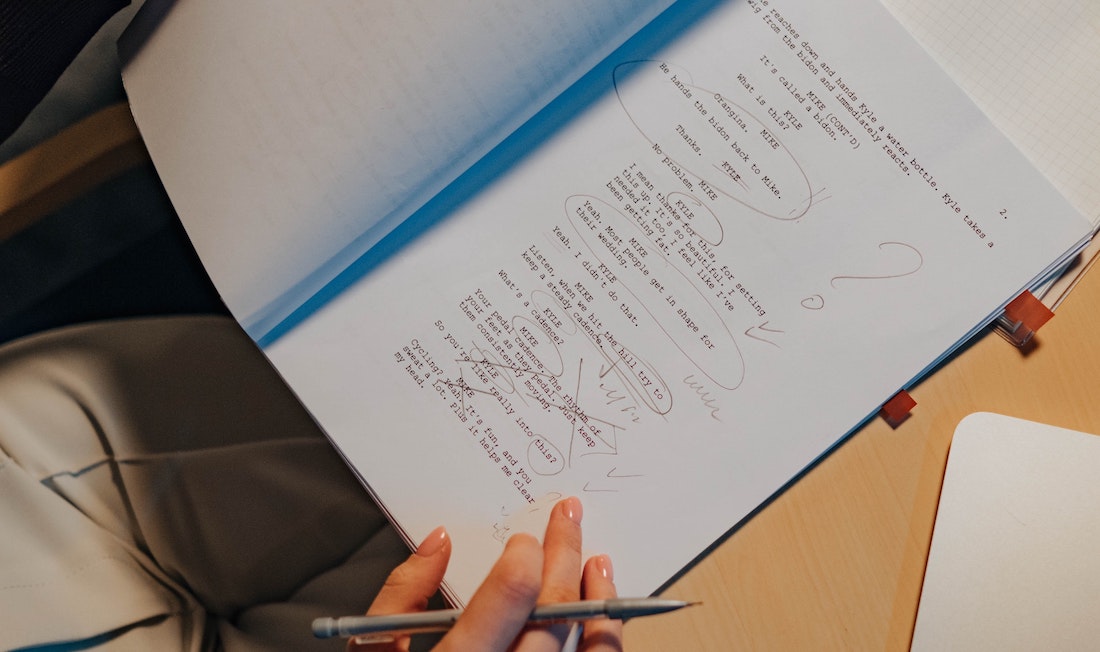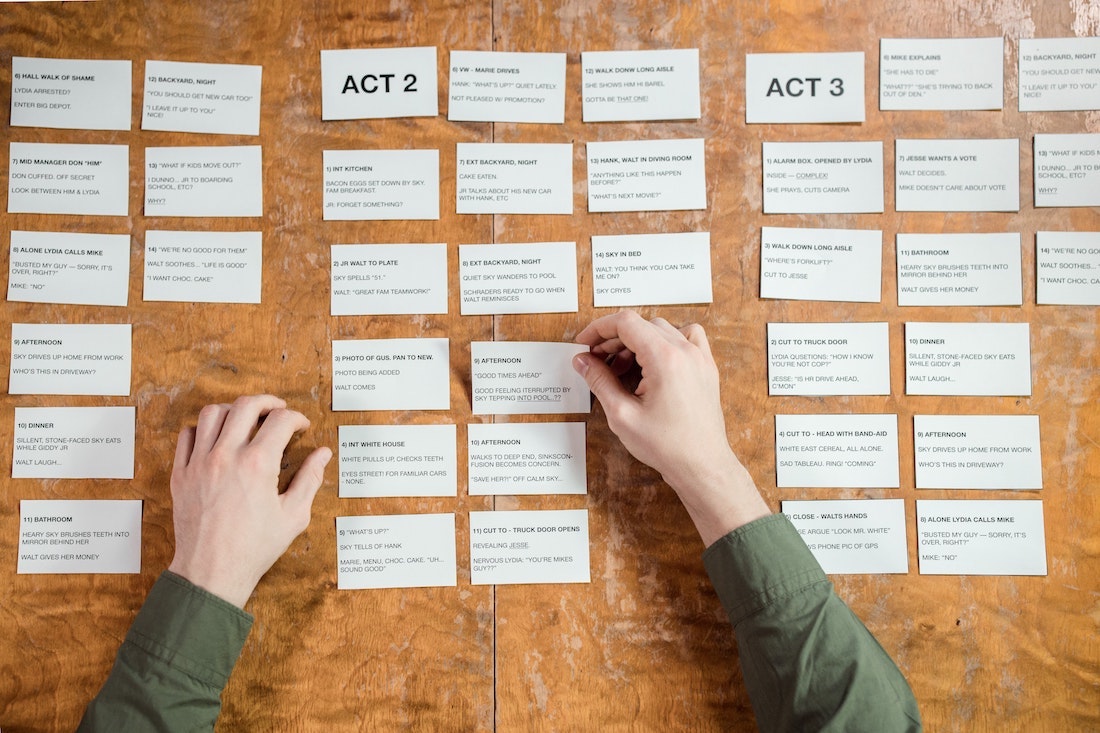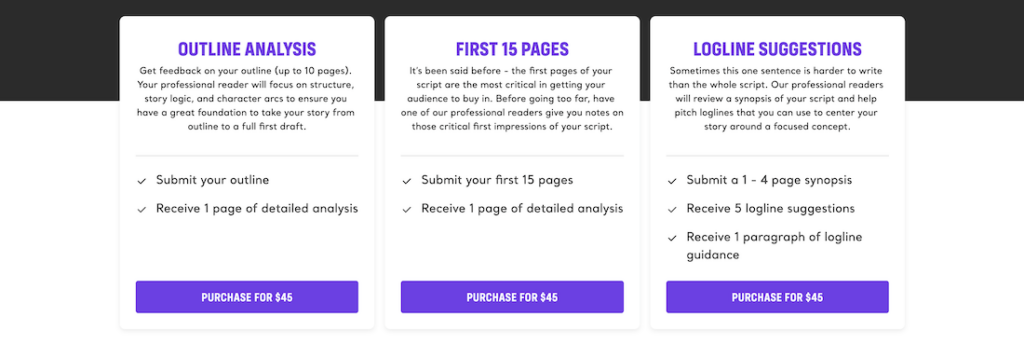So, you want to get script coverage to identify the strengths and weaknesses of your project? Awesome! However, there are a lot of different kinds of coverage out there and it can be pretty confusing to know which type to choose.
But don’t worry — we’ll go over six of the most common types of script coverage that are out there, the benefits of each, and which ones might be the best fit for you and what you’re working on.
Let’s get to it!
Want to take your script to the next level? Check out ScreenCraft’s Genre-Specific Notes!
Studio Script Coverage
Studio script coverage is a report commissioned by studios, networks, streamers, or production companies to evaluate a screenplay. It is often used to help executives decide whether to invest in a project or not.
Studio coverage can be written by an in-house script reader/story analyst or an external script consultant with a background in writing compelling and informative screenplay coverage.
An offshoot of “studio coverage” is agency or management company coverage that is written by company script readers (interns, assistants, junior executives, and professional script readers) to break down a screenplay’s relevance to the company’s clientele vision when it comes to what types of clients their agents and managers are looking to sign.
Agents and managers also use script coverage to find the best scripts for acting and directing clients.
Studio script coverage is for internal use only. Notes and analyses are not shared with the screenwriter.
Read More Everything Screenwriters Need to Know About Agents and Managers!

Development Notes
Development notes are comments and suggestions provided to a screenwriter by a development executive or producer during the script development process. These types of notes are reserved for screenwriters that have been hired for assignments or are executing contracted rewrites for scripts they have optioned or sold.
The purpose of development notes is to help the writer improve the script and bring it closer to the desired vision for the project.
Development notes can cover various topics, including story structure, character development, dialogue, pacing, tone and theme. The notes are either presented in written form or delivered via meetings or calls.
Script Consultant Coverage
Script consultant coverage is usually the most comprehensive form of script coverage, providing feedback on all aspects of the script, examining the story structure, pacing, and character development. It also includes a deeper analysis of the plot, subplots, and themes, as well as evaluations of the characters and their arcs.
This type of coverage is usually written by a script consultant hired by a screenwriter for feedback purposes and can be several dozen pages longer than what you would typically find in studio coverage.
Script consulting coverage is found through script consulting services provided by screenwriting educational websites and blogs, as well as screenwriting platforms that allow screenwriters to share their scripts with industry insiders. Screenwriters can also pay for script coverage when submitting their screenplays to screenwriting contests, competitions, and fellowships at an added cost over entrance fees.
Most quality script consultants have years of industry reading and script coverage writing experience within notable studios, networks, streamers, production companies, agencies, or management companies.

Genre-Specific Notes
Genre-specific notes are types of script coverage that offer feedback and suggestions based on the conventions and expectations of a particular film genre.
For example, horror films often follow a specific set of rules and conventions, and genre-specific notes for a horror screenplay would take those into account. The same directives would apply to other genres like action, thriller, adventure, comedy, mystery, drama, and all subgenres from those main genres.
Read More: Do You Really Know What Genre Your Screenplay Is?
Genre-specific notes can still cover story structure and character development but also pay particular attention to the tone, pacing and style as they pertain to the intended genre. The notes will detail how a screenplay fits within the overall landscape of the genre and whether it is likely to appeal to the target audience.
The interesting draw of genre-specific notes is that the script consultant chosen to review your screenplay is usually highly versed in the genre of your script. Thus, you get someone that’s clearly an aficionado of the genre you’re writing in.
Format-Specific Notes
Some script consulting platforms may have a more niche service that provides specific attention to the formatting of your screenplay. For many newcomers, format is a constant struggle. While it won’t make or break your overall script, screenplay format really does matter. Poor formatting can hinder the reading experience of your screenplay, which can highly affect studio coverage, as well as placements in screenwriting contests, competitions, and fellowships.
Format-specific notes cover all aspects of your script regarding proper formatting based on general industry guidelines and expectations.

Preparation Notes
Consulting services offer preparation notes to help ensure that the ideas, concepts, characters, and worlds of a potential screenplay are working before you begin to write your screenplay. Script consultants can evaluate your screenplay outline, allowing you to see the strengths and weaknesses of your characters and stories before a single screenplay page is written. They can also help screenwriters develop loglines and synopsis, and help you write the most engaging 10-15 pages possible.
What is Script Coverage Anyway?
Script coverage is a written analysis of a screenplay that is typically prepared by a script reader, story analyst or script consultant for development executives, producers, agents, and managers. The objective is to sort and analyze screenplay submissions that are being considered for acquisition and production.
The coverage helps a studio or production company’s development team decide whether to move forward with a project.
There are also paid services available to screenwriters that assign different types of screenplay coverage to professional script consultants offering feedback to the writer on the strengths and weaknesses of their script. This type of script coverage allows screenwriters to read and review an industry insider’s reaction to their work, allowing them to get insight into the general guidelines and expectations of the film and television industry.
What’s Included in Script Coverage?
General script coverage typically consists of a logline (one or two sentences that explain the core concept of the script), a synopsis of the story, followed by a detailed analysis of the screenplay’s structure, characters, dialogue, pacing, themes and marketability.
The coverage notes include suggestions for revisions and an overall assessment of the project’s commercial potential and relevance to the company’s future development and production slate.
Read More: What You Should and Shouldn’t Expect From Script Coverage
—
While studio coverage and development notes are internal documents of Hollywood company collaboration and development, script consultant coverage, genre-specific notes, format-specific notes, and preparation notes are all essential tools in the development process of a screenplay and the writing talents of its screenwriter.
By providing feedback and suggestions on the strengths and weaknesses of the script, as well as guidance on how to make it more commercially viable and appealing to a specific audience, these tools can help writers and development teams bring their projects to life.
CHECK OUT OUR PREPARATION NOTES SO YOU START YOUR STORY OFF ON THE RIGHT TRACK!
Ken Miyamoto has worked in the film industry for nearly two decades, most notably as a studio liaison for Sony Studios and then as a script reader and story analyst for Sony Pictures.
He has many studio meetings under his belt as a produced screenwriter, meeting with the likes of Sony, Dreamworks, Universal, Disney, and Warner Brothers, as well as many production and management companies. He has had a previous development deal with Lionsgate, as well as multiple writing assignments, including the produced miniseries BLACKOUT, starring Anne Heche, Sean Patrick Flanery, Billy Zane, James Brolin, Haylie Duff, Brian Bloom, Eric La Salle, and Bruce Boxleitner, the feature thriller HUNTER’S CREED, and many produced Lifetime thrillers. Follow Ken on Twitter @KenMovies and Instagram @KenMovies76.
The post Explaining All the Different Types of Script Coverage appeared first on ScreenCraft.
Go to Source
Author: Ken Miyamoto

